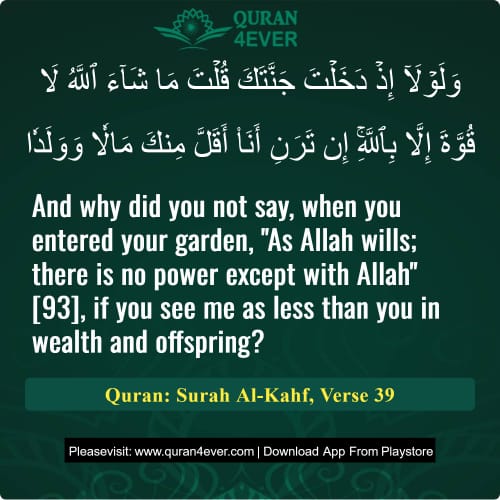
Transliteration:( Wa law laaa iz dakhalta jannataka qulta maa shaaa'al laahu laa quwwata illaa billaah; in tarani ana aqalla minka maalanw wa waladaa )
"And why did you not say, when you entered your garden, 'As Allah wills; there is no power except with Allah,' if you see me as less than you in wealth and offspring?" [93]
From this verse, two important lessons emerge:
The reality of the evil eye (nazar):
This verse indicates that the evil eye does exist, and reciting the phrase:
“MashaAllah, La quwwata illa billah” (As Allah wills; there is no power except with Allah)
is a means of protection from its harmful effects.
As Allah Almighty has also stated:
“And it seems that the infidels with their bad looks will necessarily stumble you” (Surah Al-Qalam, 68:51).
Insight of the Believer:
The believer perceives reality through the light of Allah Almighty, and whatever he foretells, comes true.
In this instance, the believer had warned of the possible downfall of the arrogant man’s garden — and indeed, divine punishment descended upon it, fulfilling his words.
The tafsir of Surah Kahf verse 39 by Ibn Kathir is unavailable here.
Please refer to Surah Kahf ayat 37 which provides the complete commentary from verse 37 through 41.
(18:39) When you entered your vineyard, why did you not say: ‘Whatever Allah wills shall come to pass, for there is no power[40] save with Allah!’ If you find me less than yourself in wealth and children
40. That is, If we are able to do anything, it is by the help and support of Allah alone.

For a faster and smoother experience,
install our mobile app now.
Related Ayat(Verses)/Topics